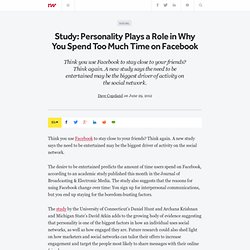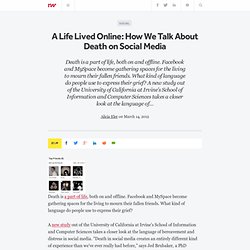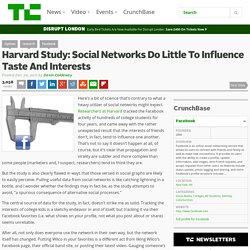

Study: Personality Plays a Role in Why You Spend Too Much Time on Facebook. Think you use Facebook to stay close to your friends?

Think again. A new study says the need to be entertained may be the biggest driver of activity on the social network. The desire to be entertained predicts the amount of time users spend on Facebook, according to an academic study published this month in the Journal of Broadcasting & Electronic Media. The study also suggests that the reasons for using Facebook change over time: You sign up for interpersonal communications, but you end up staying for the boredom-busting factors. Darlene Gant: Drug company Genentech gives dying mom cancer drug after she makes pleading video on YouTube. By Daily Mail Reporter Published: 17:56 GMT, 24 April 2012 | Updated: 22:50 GMT, 24 April 2012 A mother dying of advanced breast cancer has been given a drug that has not yet been approved after she made an emotional YouTube plea.

Darlene Gant, 46, posted a video begging drug company Genentech to give her pertuzumab on compassionate grounds - and it has agreed. It means that, although the FDA is not expected to approve the drug until June, she will get it as she has no other option. Scroll down for video. A Life Lived Online: How We Talk About Death on Social Media. Death is a part of life, both on and offline.

Facebook and MySpace become gathering spaces for the living to mourn their fallen friends. What kind of language do people use to express their grief? A new study out of the University of California at Irvine's School of Information and Computer Sciences takes a closer look at the language of bereavement and distress in social media. "Death in social media creates an entirely different kind of experience than we've ever really had before," says Jed Brubaker, a PhD Candidate at the University of California at Irvine. "Traditionally when someone dies, people come together at a certain place, certain time and grieve together - like a cemetery, wake.
" Rather than take an obvious, trendy turn toward Facebook, the study looks at MySpace users, many of whom died young. After a user dies, friends visit the page and express their sadness, shock and grief. What Do You Say To the Dead? Survey: Facebook plays a destructive role in a third of U.K. divorces. 75% of Worldwide Cellphone Users Send Text Messages [STUDY] Mobile phones are universally popular — and so is text messaging.
![75% of Worldwide Cellphone Users Send Text Messages [STUDY]](http://cdn.pearltrees.com/s/pic/th/worldwide-cellphone-messages-20379769)
Cellphone users in 21 countries were surveyed on their mobile habits and 75% replied they send text messages. A Pew Research Center Global Attitudes Project study, published Tuesday, examined worldwide use of digital communication tools such as mobile and social networks. Not surprisingly, the research found the young and well-educated are the most likely to adopt new technologies. Those under 30 who hold college degrees are most likely to use many mobile functions and social networks. Only one-half of the respondents send photos or videos, and just 23% use the Internet.
While these behaviors may be assumed most popular in wealthy countries, texting is most popular in Kenya and Indonesia, the two poorest nations included in the study. The study also looked at the popularity of social networking, which corresponds with wealthy nations where Internet access is more common. Image courtesy of Flickr, JayB.Stevens2010. Harvard Study: Social Networks Do Little To Influence Taste And Interests.
Here’s a bit of science that’s contrary to what a heavy utilizer of social networks might expect.

Researchers at Harvard tracked the Facebook activity of hundreds of college students for four years, and came away with the rather unexpected result that the interests of friends don’t, in fact, tend to influence one another. That’s not to say it doesn’t happen at all, of course, but it’s clear that propagation and virality are subtler and more complex than some people (marketers and, I suspect, researchers) tend to think they are.
But the study is also clearly flawed in ways that those versed in social graphs are likely to easily perceive. Pulling useful data from social networks is like catching lightning in a bottle, and I wonder whether the findings may in fact be, as the study attempts to avoid, “a spurious consequence of alternative social processes.” Vive le mobile: French smartphone love affair rolls on. More evidence, if it were needed, that Europe is increasingly becoming a mobile-centric culture, with figures showing that France’s smartphone market has grown 34 percent in the last year. The numbers from audience analytics firm Médiamétrie suggest that the French mobile internet now counts 18.3 million users — around half of the overall number of internet users in the country, but growing rapidly.
According to the “smartphone generation” study, 40 percent of mobile users there are now using high end handsets, and Android is gaining fast against other systems. The report comes hot on the heels of figures from Gartner that suggest the last quarter saw PC sales in Western Europe drop by 11.4 percent over the same time last year. And that’s including the business market: things were even worse in the consumer market, where sales were down more than 18 percent.